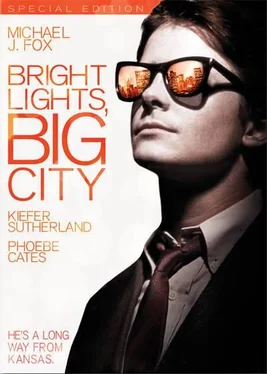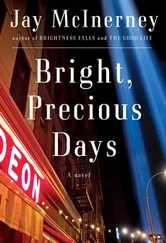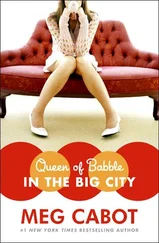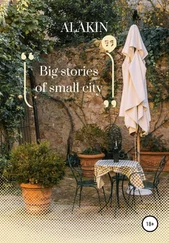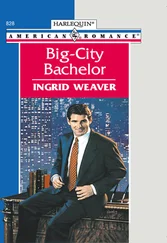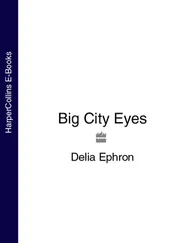"How much?"
"A hundred."
"Fifty."
"All right, eighty-five. My lowest."
You tell him you'll have to shop around. He gives you a business card with the name of an adult magazine shop. "Ask for Jimmy," he says. "I got boas and monkeys, too. My prices can't be beat. I'm insane."
You walk across town, east on Forty-seventh, past the windows of the discount jewelry stores. A hawker with an armful of leaflets drones in front of a shop door: "Gold and silver, buy and sell, gold and silver, buy and sell." No questions asked on the buying end, you presume. Chain-snatchers welcome. You stop to admire an emerald tiara, the perfect gift for your next queen for a day. Fantasy shopping. Of course, when you have money you will not stop here. You're not going to wow your dream girl with jewelry box that reads Gem-O-Rama. You'll head straight to Tiffany or Cartier. Sit in a chair in the president's office and have them fetch the merchandise for your inspection.
Hasidim hurry up and down the street, holding their hats, stopping to confer with one another, taking care not to eyeball the women in miniskirts. You examine the wares in the window of the Gotham Book Mart, and take note of the sign: wise MEN FISH here.
At Fifth Avenue you cross and walk up to Saks. You stop in front of a window. Inside the window is a mannequin which is a replica of Amanda-your wife, the model. To form the cast for the mannequin, Amanda lay face down in a vat of latex batter for ninety minutes, breathing through a straw. You haven't seen her in the flesh since she left for the last trip to Paris, a few days after she did the cast. You stand in front of the window and try to remember if this was how she really looked.
You met her in Kansas City, where you had gone to work as a reporter after college. You had lived on both coasts and abroad; the heartland was until then a large blank. You felt that some kind of truth and American virtue lurked thereabouts, and as a writer you wanted to tap into it.
Amanda grew up smack in the heart of the heartland. You met her in a bar and couldn't believe your luck. You never would have worked up the hair to hit on her, but she came right up and started talking to you. As you talked you thought: She looks like a goddamned model and she doesn't even know it. You thought of this ingenuousness as being typical of the heartland. You pictured her backlit by a sunset, knee-deep in amber waves of grain. Her lanky, awkward grace put you in mind of a newborn foal. Her hair was the color of wheat, or so you imagined; after two months in Kansas you had yet to see any wheat. You spent most of your time at zoning-board meetings duly reporting on variances for shopping malls and perc tests for new housing developments. At night, because your apartment was too quiet, you went to bars with a book.
She seemed to think you came from Manhattan. Everyone in Kansas thought you came from New York City, whether you said Massachusetts, New England, or just East Coast. She asked about Fifth Avenue, The Carlyle, Studio 54. Obviously, from her magazine reading she knew more about these places than you did. She had visions of the Northeast as a country club rolling out from the glass and steel towers of Manhattan. She asked about the Ivy League, as if it were some kind of formal organization, and later that night she introduced you to her roommate as a member of it.
Within a week she moved in with you. She was working for a florist, and thought she might eventually like to attend classes at the university. Your education daunted and excited her. Her desire to educate herself was touching. She asked you for reading lists. She talked about the day your book would be published. All your plans were aimed at Gotham. She wanted to live on Central Park and you wished to join the literary life of the city. She sent away for the catalogues of universities in New York and typed the resumes which you sent out.
The more you learned of Amanda's early life, the less surprised you were at her desire to start afresh. Her father left home when she was six. He did something on oil rigs, and the last Amanda heard he was in Libya. She got a Christmas card with a picture of a mosque. When she was ten she moved with her mother to a cousin's farm in Nebraska. It was not much of a home. Her mother married a feed-and-grain salesman, and they moved to K.C. The salesman wasn't home often and, when he was, he was either abusive or amorous to both mother and daughter. Amanda had to look after herself; you gathered her mother didn't much care about her. She left home when she was sixteen and moved in with a boyfriend, who lasted until a few months before she met you. He left a note explaining that he was moving to California.
Hers was a childhood grimmer than most, and whenever you were inclined to find her lacking, you reminded yourself to give her credit for endurance.
In the eight months you lived together in Kansas City you visited her mother only once. Amanda was skittish and snappy on the way out. You pulled up to a trailer home on a treeless street. She introduced her mother as Dolly. The feed-and-grain salesman, you surmised, was no longer in the picture. There was tremendous tension in the cramped living room. Dolly chain-smoked Kools, flirted with you, and tossed offhand jabs at Amanda. You could see that Dolly was used to trading on her looks and that she loathed and – envied her daughter's youth. The resemblance between the two was strong, except that Dolly had a bust – a difference she alluded to several times. You could tell Amanda was ashamed of her, ashamed of the velvet painting on the wall and the unwashed dishes in the sink, ashamed that her mother was a beautician. When Dolly went to the bathroom-"to freshen up," as she put it-Amanda picked up the souvenir Statue of Liberty on top of the television set and said, "Look at this. It's my mother all over." She seemed afraid that you would think it was her possession, her taste, afraid that you would identify her with Dolly.
Two years later Dolly was invited to the wedding back East. Amanda was relieved when she couldn't make it. Her father's invitation was Returned to Sender bearing a collection of Arabic postmarks, Address Unknown. There was no bride's side at the church, no one except a distant, aged aunt and uncle to indicate that Amanda's past extended farther back than the day she arrived with you in New York. That seemed to be just how she wanted it.
If your parents were not thrilled with the living-together arrangement, they went out of their way to give her a home when you returned to the East Coast. Your mother never turned away a stray dog, or heard about the plight of children in other parts of the world without volunteering her time or reaching for her checkbook, and she greeted Amanda as if she were a refugee. Amanda's need to belong was part of her attraction. It was as if you came across one of those magazine ads-"You could turn the page, or you could save a child's life"-and the child in question was right there, charming and eager to please. Long before the wedding she took to calling your parents "Mom and Dad," and the house in Bucks County "home." You were all suckered. Your father once asked you if you didn't think the vast difference in your backgrounds might be a problem in the long haul, the only expressed reservation you remember.
Before you had given the subject much thought, there was on all sides the imminent assumption of marriage. After two years of living together, it seemed the thing to do. You were uneasy-had you lived enough of your life yet?- but your scrutiny of the situation yielded no decisive objections. Amanda was desperate for it. She was always saying she knew you would leave her someday, as if you had to behave like all the other swine in her life, and apparently she thought that marriage would delay or perhaps even cancel your flight. You did not feel that you could open quite all of your depths to her, or fathom hers, and sometimes you feared she didn't have any depths. But you finally attributed this to an unrealistic, youthful idealism. Growing up meant admitting you couldn't have everything.
Читать дальше
